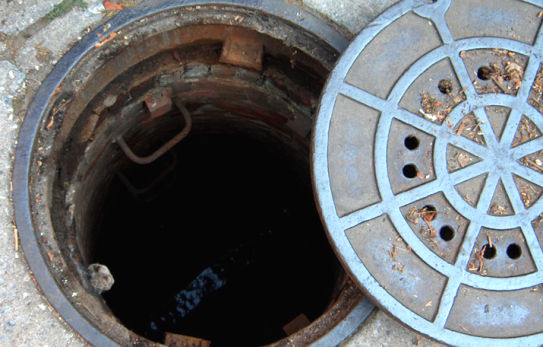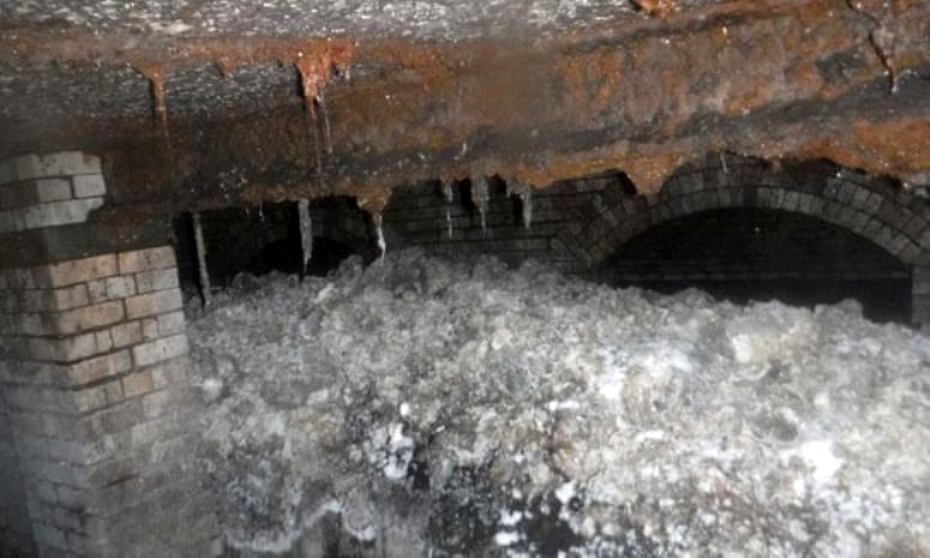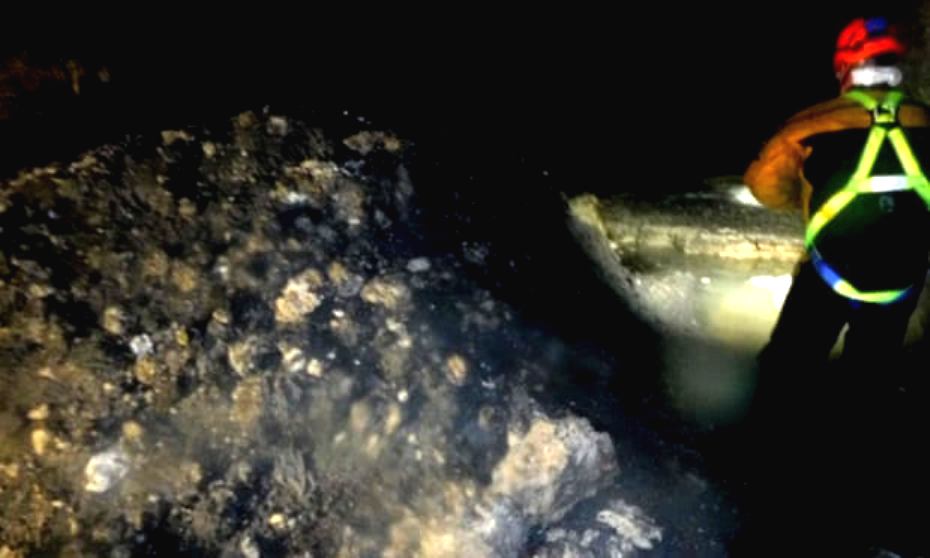

HOME ABOUT FICTION POETRY ART SUBMIT NEWS ZINES BEWARE CONTACT BEST SCARY HELLBOUND BOOKS FILM STAFF
In this month's Oddities in the News Page:
Devon sewer experienced a fatberg in England
IN THE ODDITIES ARCHIVES
What’s really in Loch Ness
Shark Tooth DNA
Military Admits to UFOs
Wild Animal Pets
Flinstone House
Fluffy the Cat
THE FATBERG

The Guardian -- A block of hardened fat, oil and wet-wipes longer than six double-decker buses has been discovered in a sewer meters from the sea in a popular Devon resort town.
The company’s director of wastewater, Andrew Roantree, said: “It is the largest discovered in our service history and it will take our sewer team around eight weeks to dissect this monster in exceptionally challenging work conditions.
“Thankfully it has been identified in good time with no risk to bathing waters. If you keep just one new year’s resolution this year, let it be to not pour fats, oil or grease down the drain, or flush wet-wipes down the loo. Put your pipes on a diet and don’t feed the fatberg.”
South West Water says a fatberg forms like a snowball – wet-wipes flushed down toilets congeal with fats, oil and grease, gradually forming a hard mass.
THE REMOVAL

The Guardian -- The first chunk of the Sidmouth fatberg, a monstrous mass of congealed oils, grease, wet wipes and other nasties lurking under the seafront of the Devon resort, has been brought to the surface at the start of an eight-week cleanup operation.
A hunk of the 64-metre long object was hauled up into the light in a yellow plastic bucket. A wet wipe – a key component of fatbergs – poked out of one side of the grey-white mess, a cotton bud from another.
Charlie Ewart, a sewer worker, said he and his colleagues could not wait to get rid of the fatberg, which has been gathering unnoticed beneath the Esplanade, a few metres from the sea, for years.
WHAT WAS IN THE FATBERG

Authorities found during analysis: q-tips, small toys, hair, cotton balls, baby-wipes, condoms, and even a set of false teeth. Plus lots of cooking oils and fats. Don't pour cooking oil down the drain!
What is a fatberg?
Fatbergs are a growing scourge infesting cities around the world—some are more than 800 feet long and weigh more than four humpback whales. These gross globs, which can cause sewer systems to block up and even overflow, have been plaguing the U.S., Great Britain and Australia for the past decade, forcing governments and utilities companies to send workers down into the sewers armed with water hoses, vacuums and scrapers with the unenviable task of prying them loose.
At their core, fatbergs are the accumulation of oil and grease that's been poured down the drain, congealing around flushed nonbiological waste like tampons, condoms and—the biggest fatberg component of all—baby wipes. When fat sticks to the side of sewage pipes, the wipes and other detritus get stuck, accumulating layer upon layer of gunk in a sort of slimy snowball effect.
Read the entire article HERE
How to take care of your plumbing (and the sewer systems)
Most homeowners do not spend a lot of time thinking about their sewer lines. Unfortunately, every year many homeowners have to deal with backed up sewer lines that make their homes uninhabitable. Many insurance carriers even offer policies to deal with backups and to help homeowners with sewer line repairs.
There are some things that homeowners can do to keep their lines running smoothly that can prevent the need for expensive sewer line repairs. Some things homeowners can do are:
1. Take care of grease the right way. Never pour grease or cooking oil down the drain. That is one of the main reasons drains will need a rooter service to be performed. Some people assume that they can pour their grease and oil down the drain if they follow that with hot water. The problem with that is that the water will cool down and when that happens, the grease or oil can harden and cause a nasty clog. When you have grease and oil, you should pour them into a container that can deal with heated products and then throw it away.
2. Use enzymatic cleaners every month. One of the easiest ways to handle drain cleaning is to use enzymes every month in your sewer lines. Some people recommend using chemical cleaners, which will get the job done but they are not good for your sewer lines the way enzymatic cleaners are. Enzymes are not chemicals, they are not at all toxic and they are actually good for your sewer lines There are few products that are as good at preventing the need for an expensive sewer line repair as enzymes. You can buy these products at home improvement stores, hardware shops, online and even at health food stores. If you use these products every month, you will keep your lines clean and clear.
3. Make sure your lines are not getting clogged with plant roots. If you have trees, shrubs or other plants that are placed too close to your lines, the roots can get in and cause a whole host of problems with your lines. Problems with roots are common reasons people need to contract with a professional to do a clogged drain service on their lines. If you let these go for too long, they can even destroy your lines and then you will be beyond the point where a sewer line repair will do the trick and a replacement may be needed.
4. Be careful with what you toss down your drains. You need to watch what you pour down your drain and what you flush in your toilet. Feminine products, paper towels and diapers can wreck havoc with your sewer lines and should never be flushed. Toilet paper has been designed to break down in water. The same cannot be said of these other paper products. They can remain intact for a long time. People do not realize it but these products can get stuck in the root system that has invaded the sewer lines and cause problems.
5. Put new lines in. If your sewer lines are old, they can be more vulnerable to invasion by the plant roots. Many of the country’s sewer lines are at least 30 years old. By replacing your sewer lines with plastic pipes, you can prevent the need for a costly flood that can happen when the sewer lines back up. If you are interested in this, there are trenchless methods to make this happen. Plastic pipes are much less vulnerable to intrusion from tree and bush roots.
6. Once a year, you should have a rooter service done. Just like it is a good idea to use enzymatic cleaners once a month to keep your sewer lines clean and clear, hiring a plumbing contractor to do a professional rooter service can help keep your system free of clogs, debris and other gunk that can get into your system and force you to have sewer line repairs done on your system. Having this done once on an annual basis will keep the system running better throughout the year.
From clogged toilets to clogged drains, a few simple steps can keep your entire system running clean and clear.
See more HERE